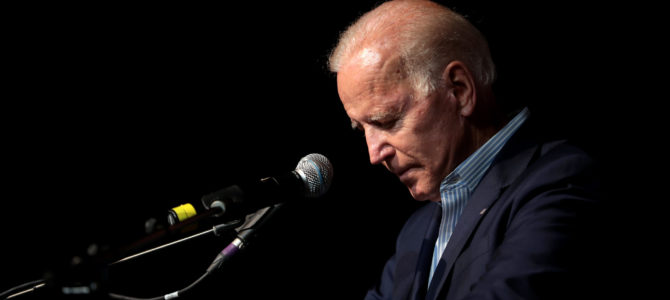
Day two of the Democratic National Convention crawled to its end late Tuesday night, meeting the halfway mark of the four-day political telethon with a speech in an empty school from former second lady Dr. Jill Biden.
The evening started slowly, with activists and politicians giving halting speeches in empty rooms of their own, gaining speed at the bottom of the hour with Bill Clinton before squandering the near-energy he generated on a long nomination and school library balloon party.
The DNC worked against itself throughout the two and a half hour digitized convention, drowning the few small chances for enthusiasm it generated by heaping tragedy, memories, and terminal illness on top of attempts to define the candidate positively, finally slumping to the finish line with Jill smiling tightly beside her husband.
Most of Monday night’s soaring backdrops and drone sequences were dropped Tuesday in favor of the more traditional backgrounds that remote political speeches have used since the beginning of TV, trading the mockery of over-done hipness for the more-manageable-but-still-real danger of boredom.
Any slim, near-impossible chance the Democratic National Committee might have realized the dangers of dead air and pulled off last-minute live-audience re-tapes were dashed when former acting Attorney Gen. Sally Yates took the spotlight first, delivering a classic political speech that Senate Minority Leader Chuck Schumer failed to improve on when his turn came round.
It’s not at all their faults: Few positive viral moments come out of most four-day conventions, but even those recent ones, like Gold Star dad-turned liberal activist Khizr Khan’s 2016 address, would have fallen flat if delivered alone in a quiet room instead of in a stadium, where roaring crowds of enthusiastic voters and the deeply-unlikely-but-still-exciting feeling of unpredictability that live television always brings, electrifying the moment.
Former President Jimmy Carter and his wife Rosalyn’s video narration ran to the themes Carter won his only term on, which the second night was clearly designed around: restoring character to the White House. Carter’s four years in the White House followed the Nixon-Ford Watergate fiasco (and a conservative primary challenge from Gov. Ronald Reagan), but led to an economic slump Reagan then capitalized on to win in 1980.
Bill Clinton followed with a classic convention speech, balancing political throat-punches with positive Biden endorsements — all couched in presidential wisdom. His is the best speech of the convention thus far (including Michelle’s intentional snub), brightly promoting Democrats while darkly attacking Republicans, but nothing could be done: A speech that should have lasted 30 minutes, including cheers and boos, was quickly over, the cameras quietly moving on from the room where Clinton, like the rest, stood alone.
The speech came just two years after Clinton was banished from the Democratic campaign trail for fear of the Me Too Movement, in light of his infidelity with an intern in the Oval Office and the accusations of rape and sexual assault he’s faced over his life. All appears forgiven again, although the already very-low chances of a protest were brought to zero by the 2020 format.
Heaping on it all, late Monday night The Daily Mail published photos of the former president getting a back massage from one of Jeffrey Epstein’s victims during a trip to Africa on Epstein’s private plane. In Clinton’s defense, the victim, then 22 years old, said he had not acted inappropriately toward her.
Any possible living-room energy a political infomercial might have generated with Clinton’s feisty speech was quickly spent in the customary runner-up-nomination of Sen. Bernie Sanders by Rep. Alexandria Ocasio-Cortez and a retired labor leader, then speeches in favor of obvious winner Joe Biden, and then a long and winding run through the states and territories of the United States endorsing a man who waited in Delaware.
There were balloons. And for the first time in the evening, a small and cheering live audience of grandkids. Better than nothing, certainly, but hardly the final-day climax of recent conventions past.
SO MUCH EXCITEMENT. pic.twitter.com/6xlNip8tPF
— Christopher Bedford (@CBedfordDC) August 19, 2020
Despite the expected yet early nomination, in one of the few constants in modern and traditional conventions alike, Biden’s acceptance speech is still scheduled for the closing night.
The evening continued past the nomination, with 30 minutes of documentary-style political ads on the deaths and tragedies Biden has experienced — and overcome — blending into stories of terminal illness from around the country, before speeches by defeated Democrat candidate John Kerry and Gen. Colin Powell, who left the GOP to endorse President Barack Obama.
Powell and Kerry’s somber speeches were followed by a documentary-style video on Biden’s friendship with the late-Sen. John McCain, including the surprise contribution of widow Cindy McCain, and culminating in the senator’s deciding 2017 vote to save Obamacare.
The second evening concluded with a touching video introduction of the widowed Joe’s courtship of his wife, Jill, ending in the death of his son Beau and return to political life. Jill Biden’s microphone captured every breath and noise she made wandering the empty halls of the empty public school they appear to have spent the evening in, lamenting school closures and recollecting her life with her husband.
Joe Biden’s story is a moving one. He’s been through an incredible amount of public tragedy, and its effects on him and those around him defined the second night of the convention. Sans cheers and balloons, the subject choice sat heavy, not helped in any way by the narrative direction the DNC chose for its surreal and empty rally.
It’s impossible to blame any of the speakers for the failures of the medium, but with the convention now halfway concluded, it’s easy to question the choice of focusing on Republican and conservative discontents in night one, then tragedy and death in night two — all without the carnival atmosphere of a massive base event to balance it out.
It’s difficult to imagine Republicans’ more hastily planned convention will proceed along similar narrative lines, but worried Republicans best hope its planners are noticing what’s missing and taking fast notes from the party that’s gone before them. This is a hard medium, and the shorter, louder, and more public the moments, the better.









